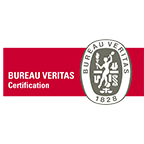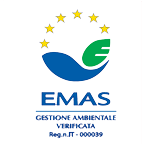THE PRODUCT
- Technology. Design. Beauty.
- Innovation and sustainable development
- A creative, inspired network
- Collaborations with universities, stakeholder/influencer dialog
- Gatherings and events
- Certifications
1 LETTER FROM THE CEO
2 THE GROUP
3 THE ORGANIZATION
4 THE PRODUCT
5 THE SUPPLY CHAIN
6 THE ENVIRONMENT
7 OUR PEOPLE
8 THE COMMUNITY
9 MATERIALITY METHOD AND MATRIX
10 OBJECTIVES
11 SDGS
SYSTEM
Environmental sustainability is central, not only because of regulatory requirements, but also as a factor in enhancing the quality of construction.
In the construction sector, as in the architectural one, the use of environmental indicators to assess the impact of products is increasingly widespread. Iris Ceramica Group has been synonymous with quality, technological innovation and above all care for the environment since the early 60s, when it decided to deviate from the usual industrial production methods by making respect for the environment an indispensable point of reference.
Over the years, certifications, particularly environmental ones, have made an extremely positive contribution by improving the Group’s performance and therefore competitiveness, encouraging everyone to continuously improve.
ENVIRONMENTAL PROTOCOLS - PRODUCT CERTIFICATIONS:
LEED and BREEAM
The LEED and BREEAM environmental protocols are among the most important voluntary scientific systems for the validation and certification of energy and environmental performance, real guidelines supporting the design, construction and management of buildings by analyzing the various aspects of sustainability: energy, health and well-being, innovation, land use and ecology, materials, pollution, transport, waste, water.
Our materials have been certified since 2008, although in reality they all complied with these standards well before that, as they are all designed and manufactured with a very high percentage of recycled material (> 40% by weight). In fact, by investing in cutting-edge technologies since the early 1990s, we have been able to exponentially reduce the consumption of all raw materials, starting with quarried ones, which have been largely replaced by pre-consumer and post-consumer recovery materials, also from other industrial processes, for the dual purpose of safeguarding the environment and transforming investments into an economic opportunity as well.
Greenguard and Greenguard Gold
Equally, the GREENGUARD certification ensures that products intended for use in interior environments have almost zero harmful volatile substance (VOC) emissions, thereby contributing to the creation of more healthful environments. GreenGuard Gold, widely recognized and accepted by sustainable building programs all over the world, certifies the total absence of risks even in places normally frequented by particularly sensitive people such as children and the elderly.
Environmental Product Declaration
A Life Cycle Assessment (LCA) was also performed on Iris Ceramica Group materials according to the "from cradle to grave" scheme published in the Environmental Product Declaration - EPD® which is the exclusive property of Iris Ceramica Group, and for this reason our materials can help increase the score of the entire building system for the LEED scheme (for the list of EPD certified materials, see www.environdec.com).
Having decided to create our own specific product EPD, issued by Environdec starting from 2017, rather than an average sector declaration, clarifies the relationship between our company and the environment and the way in which we want to offer a new market dimension, providing precise data on the environmental performance of products with key characteristics and guidelines that translate into a series of benefits for the organizations that process them and for those who use the information.
EPD® is in fact a voluntary certification scheme set up in Sweden and based on an organizational structure that includes different entities at selected levels in different countries; it is an international scheme which is part of EU environmental policies and is managed by a non-profit research institute owned by a joint foundation established by the Swedish government and industry.
The proposed “from cradle to grave” scheme is the most complex, but also the most complete and therefore the most stimulating, as well as being a global program for environmental declarations based on ISO 14025 and EN 15804.
As part of this analysis, compliance with the MEC (Minimum Environmental Criteria) is also validated according to the test methods established by Decision 2009/607/EC of 9 July 2009, or other equivalent test methods established by the Competent Authority in the respective environmental permits – Consumption and use of Water, emissions into the air, emissions into water and waste recovery.
NSF/ANSI 51 – 2014 Food Equipment Materials certification
Developed primarily for commercial applications including bars, restaurants, hotel kitchens, canteens, etc.
The ceramic tiles are now used not only as surfaces for food and drink consumption, but also in areas where there is greater direct contact with food (Food Zone), such as worktops, bar service counters, etc. This certification offers a further qualified guarantee of quality and safety for consumers.
SYSTEM CERTIFICATIONS:
Equally important are the system certifications that measure company performance and the individual impacts that production processes can have.
Environmental Management System Certification UNI EN ISO 14001.
This has existed since 2000 and is the standard that defines an “Environmental Management System” as part of the corporate system intended to manage environmental aspects, meeting legislative compliance obligations and addressing and evaluating risks and opportunities.
Eco-Management and Audit Scheme (EMAS).
Obtained immediately after UNI EN ISO 14001, registration in the European Eco-Management and Audit Scheme (EMAS) is a voluntary environmental certification tool intended for companies and public and private entities that wish to commit themselves to evaluating and improving their environmental efficiency . It provides, among other things, for the drafting of an Environmental Declaration (with which the organization gives the public and other stakeholders information about its environmental impacts and performance related to its production process) which must be validated after verification by a third-party accredited body.
UNI CEI EN ISO 50001 Energy Management System Certification
Obtained since 2015, the new international energy management standard focuses attention on the organization’s performance, and above all requires that the promotion of energy efficiency be considered along the organization’s entire distribution chain in order to achieve the continuous improvement of energy performance and a consequent reduction in costs; continuous performance analysis must therefore be integrated into the management of the organization's daily activities.
UNI ISO 45001 Occupational Health and Safety Management System (former OHSAS 18001).
Obtained since 2011, this is considered to be one of the key regulations for minimizing workplace safety problems and maintaining employee motivation.
The ISO 45001 standard aims to identify in advance the whole range of risks and dangers that can occur in the workplace, including accidents, injuries, fire and occupational diseases, carrying out detailed inspections and defining interventions to be able to deal with any potential danger or accident.
To derive the maximum benefit, this system must not only be implemented, but kept active and under continuous control, promptly making the necessary improvements and ensuring efficiency.
 |
 |
 |
 |